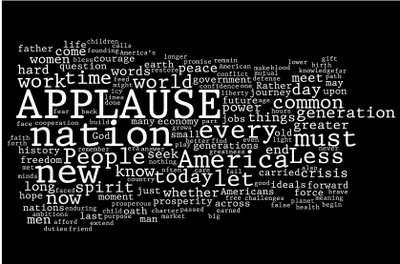More on Obama's Speech
 By way of wordle.net, Obama's speech. I used the New York Times' most recent text, in which they were kind enough to note every time the crowd broke out into applause. Hence the prominence of that word. Other words that jump out: people, America, less, new, nation, common, work.
By way of wordle.net, Obama's speech. I used the New York Times' most recent text, in which they were kind enough to note every time the crowd broke out into applause. Hence the prominence of that word. Other words that jump out: people, America, less, new, nation, common, work.Casting the speech in Wordle seemed like a good idea after reading Stanley Fish's comments on Obama's speech:
It is as if the speech, rather than being a sustained performance with a cumulative power, was a framework on which a succession of verbal ornaments was hung, and we were being invited not to move forward but to stop and ponder significances only hinted at.And if you look at the text – spread out like a patient etherized upon a table – that’s exactly what it’s like. There are few transitions and those there are – “for,” “nor,” “as for,” “so,” “and so” – seem just stuck in, providing a pause, not a marker of logical progression. Obama doesn’t deposit us at a location he has in mind from the beginning; he carries us from meditative bead to meditative bead, and invites us to contemplate.
Aside from Fish's gratuitous reference to Eliot (Why would he do that?), I rather like his description of Obama's speech. Broadly, he characterizes it as an instance of parataxis (contrasted to hypotaxis), thus placing it alongside something like the Old Testament. Parataxis, Fish suggests, is a kind of additive prose, and is:
incantatory rather than progressive; the cadences ask for assent to each proposition (“That we are in the midst of crisis is now well understood’) rather than to a developing argument. The power is in discrete moments rather than in a thesis proved by the marshaling of evidence.
While I'm not sure what to make of Fish's declaration that "Canonization has already arrived", there is an interesting way in which Obama's speech - indeed, one might say his Presidency - has been turned into a historical act almost in the act of doing in the present. Odd, I suppose, because we're often so inclined to think of history as that which has passed; here, I suppose, an invitation to think of history as that which is being made in the present.
Comments